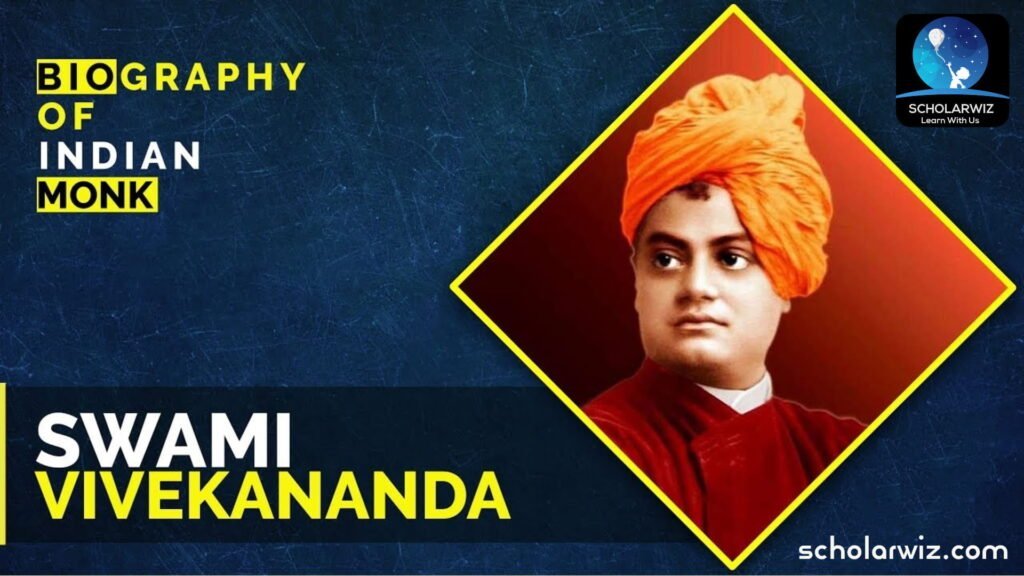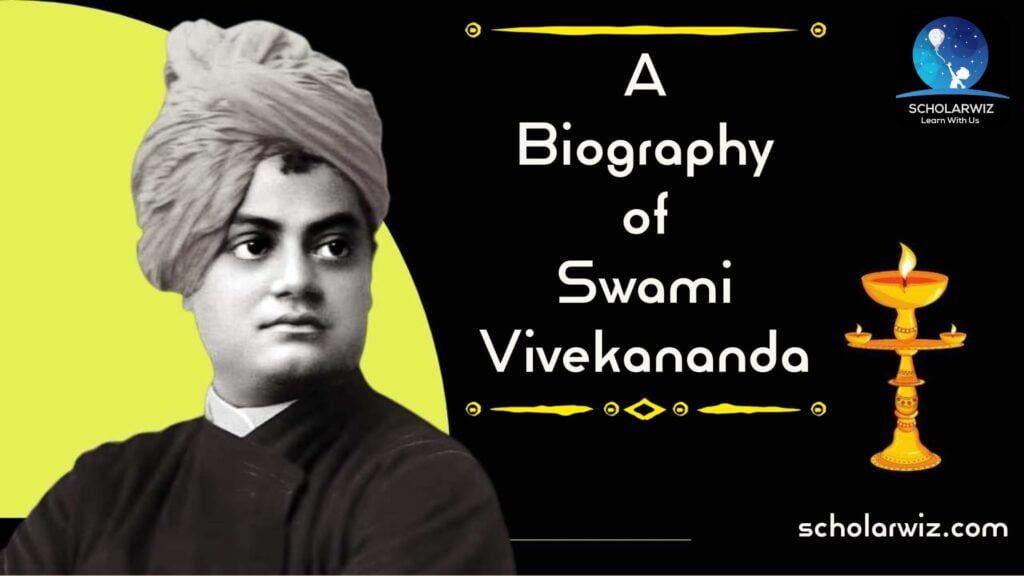
A biography of Swami Vivekananda – He was a Hindu monk and one of the most influential spiritual leaders of the 19th century. He was born as Narendranath Datta on January 12, 1863, in Kolkata, India. He was the chief disciple of the Indian mystic Ramakrishna and was responsible for spreading his teachings in India and the West.
Vivekananda was a gifted speaker and an exceptional intellectual, who was well-versed in Indian philosophy, religion, and culture. He was known for his progressive ideas and strong nationalism, which made him a powerful voice for India’s independence.
In 1893, Swami Vivekananda represented India and Hinduism at the Parliament of the World’s Religions in Chicago. His speech, which began with the words “Sisters and Brothers of America,” received a standing ovation and made him a celebrity overnight. He went on to deliver several lectures on Hinduism, spirituality, and universal peace across the United States and Europe.
Swami Vivekananda was also a strong advocate of women’s rights and education. He encouraged women to become independent and participate in the development of the nation. He established the Ramakrishna Mission in 1897, which aimed to provide education, healthcare, and social services to the poor and underprivileged.
Swami Vivekananda passed away on July 4, 1902, at the young age of 39. Despite his short life, he had a lasting impact on Indian and Western society and is considered one of the most important figures in the history of Indian spirituality. His teachings continue to inspire people around the world to this day.
The Early Life of Swami Vivekananda: A Fascinating Biography

Swami Vivekananda (A biography of Swami Vivekananda) was the youngest of nine siblings and came from a wealthy and well-educated family. His father was a successful attorney, and his mother was a devout woman who instilled in him a deep love for spirituality and religion.
As a child, Narendranath was a curious and inquisitive individual with a sharp mind. He excelled in his studies and was particularly interested in philosophy, religion, and spirituality. He was also a talented athlete and musician and had a strong sense of nationalism.
In his teenage years, Narendranath became disillusioned with the traditional religious practices that he saw around him and began searching for a deeper spiritual truth. He was introduced to Ramakrishna, a mystic and spiritual teacher, who became his mentor and spiritual guide. Under Ramakrishna’s guidance, Narendranath’s spiritual journey deepened, and he gradually developed a deep understanding of Hinduism and spirituality.
After Ramakrishna’s passing, Narendranath left home and became a wandering monk, taking the name Swami Vivekananda. He traveled extensively throughout India, seeking knowledge and gaining a deeper understanding of the country’s culture and spiritual traditions. It was during this time that he developed his ideas on nationalism, education, and spirituality that would later become the foundation of his teachings.
Exploring the History of Swami Vivekananda’s Loving Family

A biography of Swami Vivekananda – was born into a Bengali family in Kolkata, India. Swami Vivekananda had eight siblings, including six brothers and two sisters. His brothers were educated and well-respected in their respective fields, but they did not share his spiritual inclinations.
Swami Vivekananda did not marry or have children. He dedicated his life to spirituality and serving others through his work with the Ramakrishna Mission, which he founded in 1897. The Mission continues to be active to this day, working to provide education, healthcare, and social services to the poor and underprivileged in India and around the world.
Swami Vivekananda’s legacy has been carried on by the Ramakrishna Mission and the thousands of people who have been inspired by his teachings and life. He is remembered as one of India’s greatest spiritual leaders and is still revered by many as a source of inspiration and guidance.
Educational Journey – A Biography of Swami Vivekananda

Swami Vivekananda was a self-taught and self-made individual who had a strong interest in spirituality, religion, and philosophy from a young age. Despite his lack of formal education, he was a gifted speaker and an exceptional intellectual, who was well-versed in Indian philosophy, religion, and culture.
As a child, he received a traditional education, including studies in history, languages, and mathematics. He excelled in his studies and was particularly interested in philosophy, religion, and spirituality. Despite his academic success, he became disillusioned with the traditional educational system and dropped out of college before completing his degree.
It was through his interactions with his mentor and spiritual guide, Ramakrishna, that Swami Vivekananda gained a deep understanding of Hinduism and spirituality. He spent several years studying under Ramakrishna and developed a spiritual insight that would later become the foundation of his teachings.
Swami Vivekananda was a voracious reader and had a deep understanding of a wide range of subjects, including religion, philosophy, science, and politics. He used this knowledge to articulate his ideas and inspire others with his speeches and lectures.
In short, while Swami Vivekananda did not have formal education, he was a well-educated and intellectually gifted individual who had a deep understanding of spirituality, religion, and philosophy.
The 06 Best Qualities of Swami Vivekananda

Swami Vivekananda was known for his many qualities, which made him a revered figure in India and around the world. Some of his most notable qualities include:
- Spiritual Insight: Swami Vivekananda had a deep understanding of spirituality and religion and was known for his ability to articulate his ideas in a clear and concise manner. He was a gifted speaker who could inspire and motivate others with his speeches and lectures.
- Intellectual Brilliance: Despite his lack of formal education, Swami Vivekananda was a self-taught and self-made individual with a strong intellect. He was well-versed in Indian philosophy, religion, and culture and had a deep understanding of a wide range of subjects, including science, politics, and history.
- Charismatic Personality: Swami Vivekananda was known for his charismatic personality and his ability to connect with people from all walks of life. He had a warm and approachable demeanor that made him a beloved figure to those who knew him.
- Dedication to Service: Swami Vivekananda was deeply committed to serving others and dedicated his life to improving the lives of the poor and underprivileged. He founded the Ramakrishna Mission, which continues to provide education, healthcare, and social services to people in need.
- Nationalism: Swami Vivekananda was a strong advocate for Indian nationalism and was dedicated to promoting India’s cultural heritage and spiritual traditions. He saw India’s spiritual and cultural wealth as a source of pride for the nation and worked to make it a source of inspiration for others.
- Humility and Simplicity: Despite his many achievements, Swami Vivekananda was known for his humility and simplicity. He lived a simple life, free from materialistic desires, and always put the needs of others before his own.
These qualities, along with his many teachings and achievements, have made Swami Vivekananda one of India’s most revered spiritual leaders and a source of inspiration for people around the world.
Swami Vivekananda’s Rarely Discussed Real Name
The real name of Swami Vivekananda was Narendranath Datta. He was named Narendranath Datta at birth, but later took on the name Swami Vivekananda when he became a monk and began his spiritual journey. The name “Swami Vivekananda” means “a blissful monk who has attained enlightenment through vedanta (the philosophy of the Upanishads)”.
The Inspiration Behind Swami Vivekananda: The Guru Who Led Him

Swami Vivekananda’s guru was Sri Ramakrishna Paramahamsa. Ramakrishna was a Hindu mystic and spiritual teacher who lived in the 19th century. He had a profound impact on Swami Vivekananda and was instrumental in shaping his spiritual beliefs and practices.
Swami Vivekananda met Ramakrishna when he was a young man and was immediately drawn to his teachings and his devotion to God. He spent several years studying under Ramakrishna and developed a deep spiritual insight that would later become the foundation of his teachings.
Ramakrishna taught Swami Vivekananda the importance of devotion to God, selfless service to others, and the unity of all religions. He encouraged him to see God in everything and everyone and to serve others as if he were serving God.
Swami Vivekananda was deeply influenced by Ramakrishna’s teachings and regarded him as his spiritual mentor and guide. He dedicated his life to spreading Ramakrishna’s message and promoting his teachings both in India and abroad.
In short, Sri Ramakrishna Paramahamsa was the guru of Swami Vivekananda, and his teachings and guidance had a profound impact on Swami Vivekananda’s spiritual development and career.
The Legacy of Swami Vivekananda: A Collection of His Greatest Works Explored

Swami Vivekananda was a prolific writer and speaker who made many important contributions to the fields of spirituality, religion, and philosophy. Some of his most notable works and contributions include:
- Addresses at the World’s Parliament of Religions (1893): Swami Vivekananda’s most famous speeches were delivered at the World’s Parliament of Religions in Chicago in 1893. He delivered a series of powerful and inspiring speeches that introduced Hinduism and Indian spirituality to a global audience.
- Bhakti Yoga: Swami Vivekananda wrote extensively on the topic of Bhakti Yoga, which is the path of devotion and love for God. He emphasized the importance of devotion and selfless service to God and encouraged others to cultivate this attitude in their own lives.
- Vedanta Philosophy: Swami Vivekananda was a passionate advocate of Vedanta philosophy, which is the underlying philosophy of Hinduism. He wrote several books and articles on Vedanta and was known for his ability to explain complex philosophical concepts in a clear and concise manner.
- Ramakrishna Mission: Swami Vivekananda founded the Ramakrishna Mission in 1897, which is a spiritual and humanitarian organization dedicated to serving the poor and underprivileged. The mission continues to operate today and provides education, healthcare, and social services to people in need.
- Writings and Lectures: Swami Vivekananda wrote extensively on a wide range of subjects, including spirituality, religion, philosophy, and social issues. He delivered many lectures and speeches throughout India and around the world and was known for his powerful oratory skills.
- Inspiring Teachings: Swami Vivekananda’s teachings and philosophies continue to inspire and motivate people around the world. He emphasized the importance of self-discovery and self-realization, and encouraged others to develop their own spiritual practices and beliefs.
These works and contributions have made Swami Vivekananda one of India’s most revered spiritual leaders and a source of inspiration for people around the world.
Swami Vivekananda’s Most Famous Articles
Swami Vivekananda wrote many articles during his lifetime, many of which were later published in books and collections of his writings. Some of his most famous articles include:
- “The East and the West”: This article was published in the journal “Prabuddha Bharata” and explores the cultural differences between Eastern and Western societies. Swami Vivekananda argues that the West has much to learn from the spiritual traditions of the East, and that Eastern spirituality can offer a much-needed balance to the materialism and consumerism of the West.
- “The Yogas and Other Works”: This article is a collection of Swami Vivekananda’s teachings and writings on Yoga, spirituality, and religion. It includes his ideas on the different types of Yoga, such as Bhakti Yoga, Jnana Yoga, and Karma Yoga, as well as his thoughts on the importance of self-realization and the unity of all religions.
- “The Essence of Hinduism”: This article is a comprehensive overview of Hinduism, its beliefs, practices, and philosophies. Swami Vivekananda argues that Hinduism is not just a religion, but a way of life, and that its teachings offer a practical path to spiritual growth and enlightenment.
- “The Gita and Its Message”: In this article, Swami Vivekananda offers his interpretation of the Hindu scripture, the Bhagavad Gita. He explains the central themes of the Gita, including the importance of duty, the nature of God, and the ultimate goal of human life.
- “The Science of Religion”: In this article, Swami Vivekananda explores the nature of religion and spirituality, and argues that spirituality should be seen as a scientific pursuit. He explains that just as there are scientific methods for understanding the physical world, there are also spiritual methods for understanding the inner self and the divine.
These articles offer a glimpse into Swami Vivekananda’s thoughts and teachings and provide insights into his philosophy and spirituality. They continue to be widely read and studied today, and are regarded as some of the most important works of modern Indian spirituality.
How the Ramakrishna Mission Changed 19th Century India
The Ramakrishna Mission is a spiritual and humanitarian organization that was founded by Swami Vivekananda in 1897. The mission is named after Ramakrishna, who was a 19th-century Indian mystic and spiritual teacher who had a profound influence on Swami Vivekananda.
The main goal of the Ramakrishna Mission is to serve humanity, promote spiritual values, and advance social and economic development. To achieve these goals, the mission provides a variety of services and programs, including:
- Education: The mission operates a number of schools and colleges, providing education to people of all ages, particularly to those who are economically and socially disadvantaged.
- Healthcare: The mission operates a number of hospitals and health clinics, providing medical care to people in need, regardless of their ability to pay.
- Disaster Relief: The mission provides aid and support to communities affected by natural disasters and other crises, such as earthquakes, floods, and famine.
- Social Services: The mission operates a number of programs designed to support people in need, including food distribution, clothing distribution, and other forms of social support.
- Spiritual and Cultural Activities: The mission also operates a number of spiritual and cultural programs, including retreats, workshops, and lectures on spirituality, religion, and philosophy.
The Ramakrishna Mission has grown into a worldwide organization, with branches and centers in many countries around the world. It is regarded as one of India’s most important spiritual and humanitarian organizations and continues to be a source of inspiration and support for people of all backgrounds and beliefs.
Uncovering the Mystery Behind Swami Vivekananda’s Death
Swami Vivekananda died on July 4, 1902 at the age of 39. He passed away in Belur Math, near Kolkata, India, which was the headquarters of the Ramakrishna Mission, an organization he had founded in 1897.
The exact cause of Swami Vivekananda’s death is not known, but some sources suggest that he suffered from a heart attack or complications from diabetes. Despite his relatively young age and his tremendous impact on the world, Swami Vivekananda’s death was widely mourned, and he is remembered as one of India’s greatest spiritual leaders and cultural ambassadors.
Swami Vivekananda’s teachings and philosophy continue to be widely studied and admired, and his ideas on spirituality, religion, and human potential have had a lasting impact on the world. His vision of a world where people of all cultures, beliefs, and backgrounds could come together in peace and harmony, and his call for spiritual and moral renewal, remain as relevant today as they were when he first delivered them over a century ago.
05 Inspiring Lessons to Learn from Swami Vivekananda
Swami Vivekananda’s life and teachings offer many lessons that can be applied to our own lives. Here are a few of the key lessons that we can learn from him:
- The power of self-awareness: Swami Vivekananda believed that self-awareness was the key to personal growth and transformation. He encouraged people to look within themselves to discover their true potential and to work towards becoming their best selves.
- Service to others: Swami Vivekananda was a firm believer in the importance of serving others, and he encouraged people to use their talents and abilities to help those in need. He taught that the best way to find inner peace and fulfillment was to focus on the well-being of others.
- The unity of all religions: Swami Vivekananda was a strong advocate for religious tolerance and unity, and he believed that all religions were different paths to the same divine truth. He encouraged people to respect and learn from different religions, and to strive for a world where people of all beliefs could live in peace and harmony.
- The power of positive thinking: Swami Vivekananda taught that positive thinking and self-confidence were essential to success and happiness in life. He encouraged people to cultivate a positive outlook, to focus on their strengths, and to overcome their weaknesses through hard work and determination.
- The importance of education: Swami Vivekananda was a strong advocate for education, and he believed that education was the key to personal and social progress. He encouraged people to seek knowledge and to use it to make a positive impact in the world.
These are just a few of the many lessons that we can learn from Swami Vivekananda’s life and teachings. By following his example, we can strive to become better, more compassionate, and more enlightened individuals, and to make a positive impact in the world.
Final Thoughts
A biography of Swami Vivekananda left an indelible mark on the world with his teachings and humanitarian efforts. His immense dedication and service to humanity reminded us of the power and importance of selfless giving. He was a great inspiration to many, challenging our beliefs on religion, social justice, unity, and other areas in life. Throughout his life, Swami Vivekananda worked for the betterment of others. His words will continue to inspire generations for years to come.
A Biography of Mother Teresa: A Ray of Hope and Love





